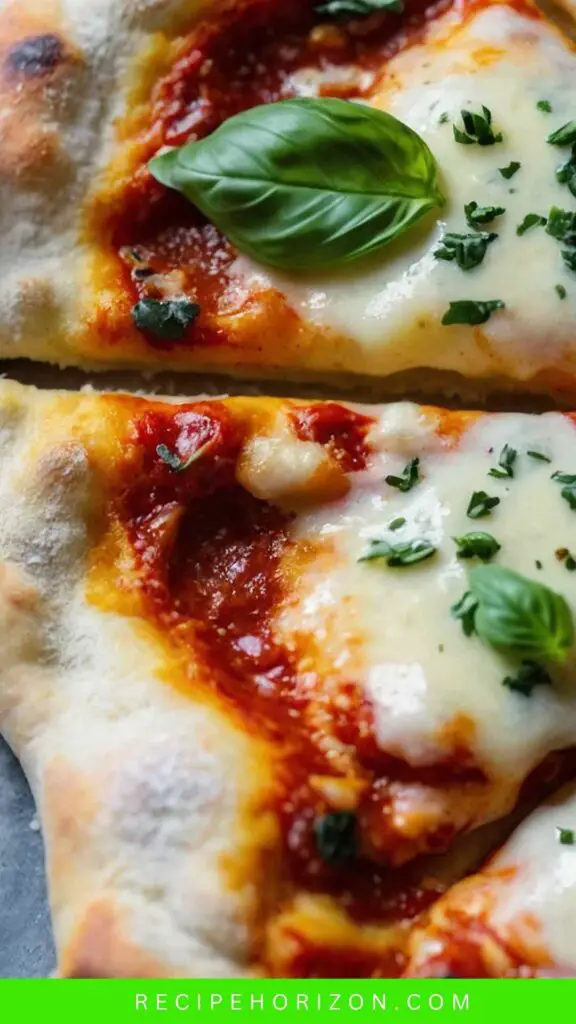When that craving for pizza strikes, it’s not just about the dough. Think about what you can pile on top! Here are a few delightful pairs that elevate your homemade pie:
- Fresh Basil and Mozzarella: The classic margherita combination. Fresh basil adds a burst of flavor, and creamy mozzarella brings it all together.
- Pepperoni and Olives: A timeless favorite, pepperoni introduces a spicy kick, while olives contribute their unique brininess.
- Pineapple and Ham: Sweet and savory collide in this controversial topping combination. Love it or hate it, it’s undeniably delicious for many.
- Vegetables Galore: Toss on bell peppers, mushrooms, onions, and zucchini, and watch your pizza transform into a vibrant meal filled with nutrients.
- BBQ Chicken: Shredded chicken coated in BBQ sauce with red onion and cilantro makes for an exciting twist on the traditional pizza.

You’ll Also Like These Recipes
- Honey Soy Chicken Drumsticks, Thighs, or Wings Recipe
- Black Lentils with Spinach Labneh Recipe
- Cheesecake Factory Jambalaya
There’s something magical about homemade pizza dough. You mix a few simple ingredients, allow some time for rising, and voilà—you are on your way to creating your masterpiece. Remember slapping that dough around, creating crazy shapes, and feeling like a culinary genius? I do. It’s not just about making pizza; it’s about bonding with friends and family while tossing flour and spreading laughter.
I’ve perfected a homemade pizza dough recipe that’s simple, quick, and downright delicious. Trust me; you’ll want to make a couple of batches. This recipe opens the door to a whole new world of pizza possibilities. So let’s grab our aprons, roll up our sleeves, and get our pizza game on!
What is Homemade Pizza Dough?
Homemade pizza dough is a blend of basic ingredients that transforms into a stretchy, pliable dough ready for your favorite toppings. The foundation of any great pizza begins with this dough, which you can customize according to your preferences.
The beauty of making your dough is that you control the ingredients. No preservatives or hidden additives are lurking here. Just pure, homemade goodness that brings warmth to the heart and soul.
How Does It Taste Like?
If you’ve never tasted homemade pizza dough, you’ve got a treat waiting for you. Fresh from the oven, it’s slightly crisp on the outside and soft within. When you take a bite, it has a slight chewiness that draws you in.
The flavor is subtle yet inviting, perfectly complementing any toppings you crave. Whether loaded with cheese or heaped with vegetables, the dough enhances your culinary experience.
Why You’ll Love This?
You’re going to love this recipe for several reasons:
- Simplicity: This dough comes together in no time. You don’t need to be a master chef to pull it off.
- Versatility: Shape it into a round, square, or even a calzone! The options are limitless.
- Cost-Effective: Skip the overpriced takeout and make something better at home.
- Customizable: Add herbs or spices directly in the dough for extra flavor.
- Family Fun: It’s a great way to engage everyone in the kitchen. Let the kids help knead!
Ingredients
To make this mouthwatering pizza dough, gather the following ingredients:
- 1 Tablespoon active dry yeast
- ½ teaspoon garlic powder
- 1 Tablespoon granulated white sugar
- 2 to 2 ½ cups all-purpose flour
- 1 teaspoon dried Italian seasoning blend
- 1 teaspoon fine sea salt
- 1 Tablespoon extra virgin olive oil
- 1 cup warm water (about 105°F)

Step-by-Step Directions
Step 1: Activate the Yeast
Start by placing 1 cup of warm water (about 105°F) in a mixing bowl. Add the granulated sugar and active dry yeast. Stir gently and allow this mixture to sit for about 10 minutes. It should become frothy, indicating the yeast is alive. If it doesn’t foam, you may need to start over with new yeast.
Step 2: Combine Dry Ingredients
In another bowl, mix together 2 cups of flour, garlic powder, Italian seasoning, and sea salt. Use a whisk to combine these dry ingredients well. The flavors of the garlic powder and Italian seasoning will enhance your dough.
Step 3: Form the Dough
Once the yeast mixture is foamy, add it to the dry ingredients along with 1 tablespoon of olive oil. Stir the mixture with a wooden spoon until a dough begins to form. If it’s too sticky, gradually add more flour, one tablespoon at a time, until the dough is manageable.
Step 4: Knead the Dough
Transfer the dough onto a floured surface. Knead it for about 5 to 7 minutes. This process develops the gluten, which gives the dough that perfect stretchy texture. You want a smooth and elastic consistency by the end.
Step 5: First Rise
Place the kneaded dough in a greased bowl, covering it with a damp cloth or plastic wrap. Let it rise in a warm area for about 1 to 1.5 hours. It should double in size. This is a fantastic time to grab a snack or catch up on your favorite show!
Step 6: Shape the Dough
Once the dough has risen, punch it down to release the air. Transfer it back to the floured surface and divide it into two equal portions. Roll each portion into your desired shape and thickness, whether that’s a classic round or a fun-shaped crust.
Step 7: Pre-bake (Optional)
For a crispier crust, consider pre-baking your dough. Preheat your oven to 475°F and bake the dough for about 5-7 minutes until it’s just starting to set but not brown.
Step 8: Top and Bake
Finally, top your shaped dough with your favorite sauce, cheese, and toppings. Bake in the preheated oven for 10-15 minutes, or until the crust is golden and the cheese is bubbly.
Tips on Making Homemade Pizza Dough
- Use Fresh Ingredients: Always check the expiration date on your yeast. Fresh yeast is crucial for rising.
- Temperature Matters: Ensure your water is warm but not hot. Hot water can kill yeast.
- Flour Variety: Experiment with different flours. Bread flour gives more chewiness, while whole wheat flour adds a nutty flavor.
- Extra Flavor: Consider adding parmesan cheese or herbs directly into the dough for an extra flavor boost.
- Resting is Key: If time allows, let the dough rest longer after kneading. This relaxes the gluten and makes it easier to stretch.
Nutrition Information
- Serving Size: 1 pizza crust
- Calories: Approximately 200
- Protein: 6g
- Carbohydrates: 36g
- Fat: 3g
- Sodium: 200mg
How Do You Store This Homemade Pizza Dough Recipe?
Store any leftover dough in an airtight container or a resealable plastic bag in the refrigerator. When you’re ready to use, let it come to room temperature before rolling it out. If you want to save it for later, you can freeze the unbaked dough. Just ensure it’s well-wrapped in plastic wrap and placed in a freezer-safe bag. It can last up to three months in the freezer.

What Other Substitutes Can You Use in Homemade Pizza Dough Recipe?
- Gluten-Free Flour: If you’re avoiding gluten, gluten-free flour blends work well. Just ensure they contain binding agents like xanthan gum.
- Yogurt: For a quick and fluffy option, mix Greek yogurt with flour. It eliminates the need for yeast.
- Cauliflower: You can create a veggie crust using cauliflower rice. It’s low-carb and surprisingly tasty.
- Whole Wheat Flour: Substitute all or part of the all-purpose flour with whole wheat flour for added nutrients.
- Cornmeal: For a little crunch and flavor, consider adding cornmeal to the flour mixture.

Homemade Pizza Dough
Ingredients
Equipment
Method
- Start by placing 1 cup of warm water (about 105°F) in a mixing bowl. Add the granulated sugar and active dry yeast. Stir gently and allow this mixture to sit for about 10 minutes. It should become frothy, indicating the yeast is alive. If it doesn’t foam, you may need to start over with new yeast.
- In another bowl, mix together 2 cups of flour, garlic powder, Italian seasoning, and sea salt. Use a whisk to combine these dry ingredients well. The flavors of the garlic powder and Italian seasoning will enhance your dough.
- Once the yeast mixture is foamy, add it to the dry ingredients along with 1 tablespoon of olive oil. Stir the mixture with a wooden spoon until a dough begins to form. If it’s too sticky, gradually add more flour, one tablespoon at a time, until the dough is manageable.
- Transfer the dough onto a floured surface. Knead it for about 5 to 7 minutes. This process develops the gluten, which gives the dough that perfect stretchy texture. You want a smooth and elastic consistency by the end.
- Place the kneaded dough in a greased bowl, covering it with a damp cloth or plastic wrap. Let it rise in a warm area for about 1 to 1.5 hours. It should double in size. This is a fantastic time to grab a snack or catch up on your favorite show!
- Once the dough has risen, punch it down to release the air. Transfer it back to the floured surface and divide it into two equal portions. Roll each portion into your desired shape and thickness, whether that’s a classic round or a fun-shaped crust.
- For a crispier crust, consider pre-baking your dough. Preheat your oven to 475°F and bake the dough for about 5-7 minutes until it’s just starting to set but not brown.
- Finally, top your shaped dough with your favorite sauce, cheese, and toppings. Bake in the preheated oven for 10-15 minutes, or until the crust is golden and the cheese is bubbly.
Nutrition
Notes
- Use Fresh Ingredients: Always check the expiration date on your yeast. Fresh yeast is crucial for rising.
- Temperature Matters: Ensure your water is warm but not hot. Hot water can kill yeast.
- Flour Variety: Experiment with different flours. Bread flour gives more chewiness, while whole wheat flour adds a nutty flavor.
- Extra Flavor: Consider adding parmesan cheese or herbs directly into the dough for an extra flavor boost.
- Resting is Key: If time allows, let the dough rest longer after kneading. This relaxes the gluten and makes it easier to stretch.
Tried this recipe?
Let us know how it was!Frequently Asked Questions
1. Can I use instant yeast in place of active dry yeast?
Yes! Instant yeast can be directly added to dry ingredients without the need for proofing. Just the same amount will do; it might even rise faster.
2. What is the ideal rising environment for the dough?
A warm, draft-free area is perfect. You can turnover the oven light without turning the oven on, creating a cozy spot for your dough to rise.
3. How can I make my pizza crust crispy?
For a crispy crust, you can pre-bake the dough before adding toppings or bake it on a pizza stone instead of a flat pan.
4. Can I make the dough ahead of time?
Certainly! You can prepare the dough a day in advance and store it in the refrigerator. Just allow it to come to room temperature before shaping.
5. What’s the best way to prevent sticking?
Always flour your surface and your rolling pin. Also, using parchment paper during baking can help lift the pizza off the pan easily.
6. Can I add flavors directly into the dough?
Absolutely! Feel free to mix in your favorite herbs or spices directly into the flour. This gives a delicious flavor profile to your crust.
Conclusion
Making homemade pizza dough is a rewarding experience. From the simplicity of the ingredients to the joy of watching it rise, each step offers a sense of fulfillment. This recipe isn’t just about getting a dough ready; it’s about creating deep, flavorful memories with each delicious slice. Whether you’re hosting a pizza night or indulging as a midnight snack, homemade dough will elevate your pizza experience to new heights. So, gather your ingredients, invite your friends, and let’s get that pizza party started!




